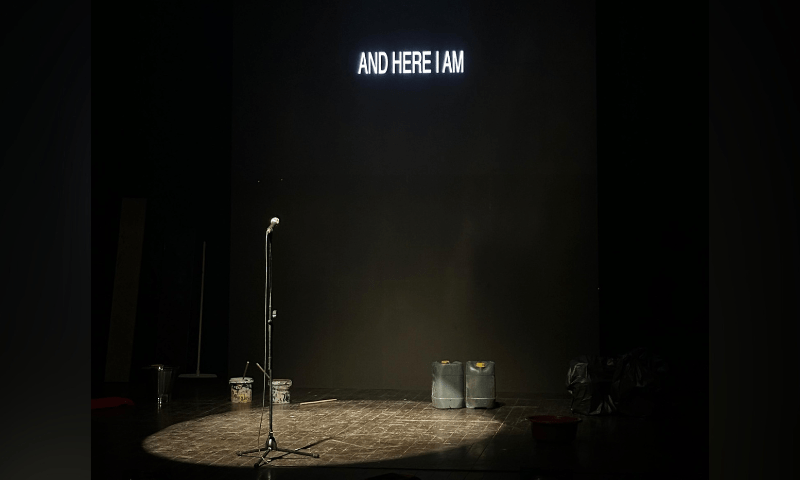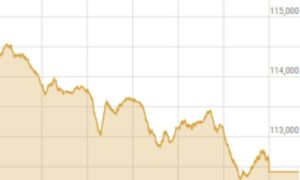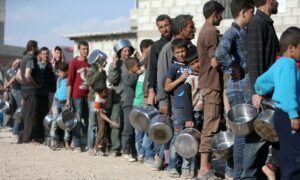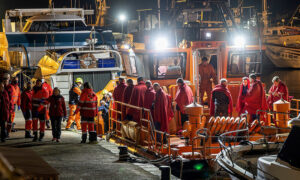In his play, And Here I Am, Ahmed Tobasi depicts the realities of living under occupation and the effect it had on him and the people around him.
The Palestinian art director of the Freedom Theatre staged his play — entirely in Arabic — as part of the Arts Council’s World Culture Festival in Karachi on Oct 25. The play mirrors his own life — he was born and raised in the Jenin refugee camp in the West Bank.
While speaking to Images and through the play, Tobasi redefined the term ‘resistance’, going beyond the definition commonly held by the world.
The play — originally written in 2017 — followed Tobasi’s life and portrayed different aspects of growing up under Israeli occupation, beginning with his father’s arrest during the first Intifada when Tobasi was around five years old.
Tobasi and childhood friends fought for the resistance during the second Intifada when they were just teenagers after having trained for only a day.
He was sent to the Ktzi’ot prison in the Negev desert after he was captured and spent four years there.
Tobasi takes pride in his struggles and believes that as an artist, he must fight for his values. “When I look at other artists, other people, other companies […] I’m happy that I come from that place that made me who I am today,” he said.
“I’m not doing art for entertainment. I’m not doing art because I have nothing to do. I’m not researching and spending time to find the subject to talk about,” the playwright explained. “My life is full of very important things that I need to talk about.”
Following the course of Tobasi’s life, the play explored ways to resist an occupation without weapons.
The Freedom Theatre Associate Director Zoe Lafferty said the play was “about exploring the different methods” of resistance. “It’s more cultural resistance than armed resistance,” she told Images after the performance.
However, the play is not about putting the gun down and starting a separate movement. Rather, she explained, armed resistance was part of it as well, calling resistance without guns a “romantic idea of the West”.
She said Juliano Mer-Khamis — the award-winning Arab-Israeli actor and director who was Tobasi’s mentor — would always say the third Intifada would be a “cultural intifada” and that was what the group was exploring in the play.
When the word ‘resistance’ comes up, there is an underlying assumption that it involves weapons and violence. But Tobasi was taught to view resistance through the lens of culture by his teacher, Mer-Khamis.
“Theatre can be as violent as a gun […] stage can be your AK-47,” Mer-Khamis told a 21-year-old Tobasi after he joined the Freedom Theatre on his return from prison.
Tobasi decided then not to join the resistance. However, his former group’s leader, Fadi, started blackmailing him, alleging that he was colluding with the Israelis. His only way to prove he wasn’t an Israeli spy was to join the resistance. They offered Tobasi huge sums of money as well, something he was desperately in need of, given the lack of opportunities to earn.
However, Tobasi instead chose to join Mer-Khamis.
Mer-Khamis, the son of a Jewish mother and Christian Arab father, founded and ran the Freedom Theatre in Jenin’s refugee camp in the northern West Bank. He taught Tobasi what it meant to resist through culture.
While speaking after the play — which concluded at Mer-Khamis’ death — Tobasi said he was sure his mentor was “smiling now in his grave that I continue the message in the same way he wanted”.
Mer-Khamis was driving his car in 2011 near the theatre with his infant son and a babysitter when a gunman ordered him to pull over and shot him five times.
“He challenged me so much as a Palestinian that I don’t know what to do […] I’m just weak, crying,” Tobasi said, adding that working with him “was a very big challenge”. That challenge resulted in his departure from the Freedom Theatre at one point.
“I told him, ‘I’m going to go be an actor without you and come back’,” he said, hoping at the time to make “myself without him”. This dream was short-lived because Mer-Khamis was killed before Tobasi could finish his studies in Norway.
“I lost him,” Tobasi lamented.
Following Mer-Khamis’ death, the playwright returned to take his place as the artistic director of the Freedom Theatre where it all started.
“I dream about him a lot,” he said, adding that he wanted Mer-Khamis to see where he had reached in his life. “And I was like f*** [you], Juliano. If you see me today. I am [in] your position. I am the artistic director of the Freedom Theatre,” Tobasi said.
“I dream about him all the time. I promise you, he comes to my dream smiling, and he’s happy […] ‘you’re doing well’. And I’m sure he’s smiling now in his grave that I continue the message in the same way he wanted,” the playwright added.
Cultural resistance
Tobasi said it was very important not to portray resistance as a single tool or in one colour. He wanted Palestine to not only be known for the people who died with guns but for the people who brought its culture to the world.
“Many people got to know Palestine through artists, through writers Mahmoud Darwish […] Edward Said, all these intellectual people who shared Palestine in different cultures,” he explained.
“It’s our right to resist in all the ways possible. It’s all we should fight with. [With] culture, with art, with my mother making food, with the teacher in the school, with the doctor in the hospital,” Tobasi said.
“We should create the culture of resistance [for] everyone, wherever you are, whatever position you are in,” Tobasi said. “We should make our life resistance”.
Lafferty said that while it was a right to carry out “armed resistance when you’re being occupied”, it was also important to “find ways to take the story outside”.
“We don’t see them as necessarily separate or one is better or right […] We know throughout history that you don’t get rid of your oppressors without armed resistance,” she said.
However, the director added that the purpose of the play was to explore different methods of resistance through culture.
“Obviously there’s boycotts, civil disobedience […] protests […] all sorts of different ways,” she said, adding that the people under Israeli occupation were “experts in all the different strategies and methods of resistance”.
Lafferty, while using Tobasi’s example, said that he had faced oppression at the hands of the occupier and took up arms as a consequence to resist at one point in his life, which was why he could talk about it.
Last year, Tobasi was abducted for 24 hours after the bombardment started in Gaza and was tortured by the Israeli police. “Our producer […] was taken in December, and he’s been held since then […] Another one of our young students, Jamal was also taken for eight days,” Lafferty said.
While talking about how the conflict did not start on October 7, she said: “It is not new when you have this moment in the play and his clothes are taken off, and he’s blindfolded and he’s left on the ground.
“We’ve seen these images again, […] however many years later, and there are so many moments like this, where you’re both watching history and you’re watching the present,” she said.
“Many of the things he describes in this play […] going back 20, 30 years, we are seeing in Gaza now,” she said.
Growing up under occupation
Tobasi introduced around nine people in the play — Mer-Khamis, Sami, Munir, Ashraf, Sanaa, his parents and his sisters.
The four friends — Sami, Ashraf, Munir and Tobasi — grew up in the streets of Jenin. Ashraf, the leader of the pack, dreamt of playing for Real Madrid, however, Sami had little faith in Ashraf’s dreams.
“You live under occupied territory, you cannot play for Real Madrid,” Sami used to tell Ashraf when they were kids.
Little did these boys know that they would be fighting in the second Intifada together; that Munir would be shot in front of Tobasi’s eyes; that he would try “to piece” his friend’s brain together.
Tobasi said one of the biggest shocks of his life was losing Munir the way he did. “All I remember from that, that time before he got shot […] he’s loved by everyone in the camp. You can imagine what kind of character he is. Everybody loved him. Everybody loved him,” he recalled.
When asked about what Munir would be doing today if he had lived under normal circumstances, Tobasi, reminiscing about his “very soft, nice” friend, said he would have expected him to travel a lot.
“Munir is someone who loves travelling, who loves other cultures. And I think Munir would be a very smart man who can find solutions […] creative ideas for things,” he said.
Munir, according to Tobasi, was not a big, tough man, however, he “loved a tough play or soccer game”.
Ashraf, an adventurer who loved nature, would be travelling on his motorbike jumping on the mountains or in the rivers, Tobasi said, however, he probably wouldn’t have managed to play for Real Madrid as he had wanted to when he was a child.
Tobasi confirmed that all three of his friends whom he grew up with were dead, as opposed to the play’s ending where Sami’s fate is left undiscussed.
He explained that the reason for excluding Sami’s death from the play was to maintain its dramaturgy. “We cannot make everyone martyr, martyr, martyr,” he said.
Tobasi in the play fell in love with Sanaa whom he used to write letters to via his young cousin, Mustapha. The initial conversation between the pair was confusing, as Tobasi did not know what to ask her after Sanaa had told Mustapha to ask Tobasi to write to her.
“What is your favourite colour?” Tobasi asked. “Orange,” she replied. Tobasi wore an orange shirt on the stage as he related this heartbreaking love story.
The pair, throughout the play, carry on their love story through letters and calls. During his time in prison, Tobasi kept calling Sanaa via a fellow prisoner’s phone.
The couple broke up after Sanaa grew busy studying for her medical exams, prompting Tobasi to “never disturb her again”. Though he saw her on the street after he returned to Jenin, he couldn’t muster the courage to approach her.
Sanaa of the play was married to someone else after Tobasi returned from Norway. “I think she’s [still] married,” Tobasi told Images.
“To be honest, I saw her […] after I came back from Norway. Some years [later] I saw her, but I saw her with her husband,” he said. Tobasi didn’t know whether Sanaa followed her dream of becoming a doctor
When asked why he returned to Jenin — and life under occupation — after experiencing normalcy in Norway, Tobasi said: “It’s not about you anymore. It’s about the family.”
“For sure, I’m outside, I can be safe, I’m happy, but I am worried about them. When I am there, I am with them,” he explained, adding that he could not live with the times where he was unable to communicate with his family.
“I start to imagine things that make me so worried and not really enjoy what I’m doing,” he said.
He hoped that the crisis would be over soon and he could take his family out of Jenin, however, he was not sure about his father who refused to leave their house, despite receiving bomb threats. “I left my house once when I was young. I’m not leaving again. If I die, I die in my home,” Tobasi quoted his father.
According to the play, Tobasi’s father was arrested after the first Intifada. His father, like him, had supported armed resistance once as well.
In his interview and through the play, it was evident that Tobasi had absolute clarity about his life’s purpose — for the people of Palestine to be known for what they have given to the world, and will continue to give.
Though Tobasi’s story is one of pain and suffering under the occupation, he returned to Jenin after Mer-Khamis’ death to take his mentor’s place and continue his work.
In the play, Tobasi took centre stage: “This is it. My chance to turn things around! It’s time to begin.”







